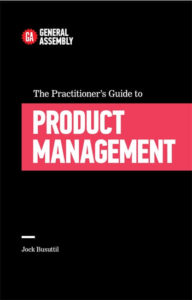
PRODUCTHEAD: Who’s in charge? You or the process?
PRODUCTHEAD is a regular newsletter of product management goodness,
curated by Jock Busuttil.
how i made my products #
every PRODUCTHEAD edition is online for you to refer back to
tl;dr
An inflexible process means working with incomplete information and making the wrong decisions
Treating work as closed-ended projects leads to context switching and discontinuity
A way to increase value in Scrum is to involve the team members in the discovery and strategy work
Respect is not deference; it demands that we challenge each other to be the best we can be
hello
Process exists to help us repeat a set of tasks more efficiently, productively, consistently, even safely. And yet product managers tell me time and time again that they’re struggling to get things done. Why? “The process.”
Creatures of habit #
Process is not inherently a bad thing. We are creatures of habit. Following an established routine to perform a task lightens our cognitive load. Having to actively figure out how to do something for the first time requires far more mental effort in comparison, so we’re naturally biased against doing this.
Without a process, we can find ourselves wasting time having to figure out the right steps and the right order from first principles every time. A lack of process means we risk falling into the same traps each time because we’re failing to learn from our mistakes.
A sense of control #
Process also lends us a sense of control. By making our activities conform to a process, we feel that we are more in charge of them. When we successfully complete a process, we receive a little dopamine hit. Our organisation may also reward the completion, providing further incentive to conform. Again, these are not problematic in themselves.
We create process based on a snapshot in time. It’s (hopefully) the best way we’ve figured out to do something, given the constraints on how we can do it. But even if it was originally fit for purpose, when things change we need to adapt the process.
We might need to start delivering a different valuable outcome; perhaps external constraints have changed, removing the need for particular workarounds. Failing to adapt means the process and the desired outcome drift out of alignment. The process starts to hinder rather than help.
When the process becomes more valued than the outcome #
Problems also arise when ‘following the process’ becomes more valued by the organisation than ‘delivering something of value’. These two things are not the same.
You might encounter this as explicit blocking of your attempts to deviate from the norm by the process owner (“You’re not following the designated process for X”) or as more subtle discouragement (“Oh no, that’s not how we do things here”).
If your process sets you up to deliver something crappy, then even if the process is ‘good’ and followed well, the best you can hope for is to become really efficient and consistent at delivering crappy things.
Final thoughts #
Processes should exist to facilitate value creation and to serve the needs of the people using the process. When that stops happening, or when ‘following the process’ becomes more valued than delivering something of value, it’s time to inspect, adapt and improve.
This week’s edition of PRODUCTHEAD #
This week I have a few articles for you that dive more deeply into the tension between consistency of process and flexibility of approach. The first is Jeff Gothelf’s interview with Selena Hadzibabic. She describes how she optimises her teams for better decision-making over consistency of process.
John Cutler as always does an excellent job of articulating the nuances of team collaboration and working styles. In particular he draws out the tendency of product teams (the ones delivering the product) to hold onto flexibility as long as possible to keep their options open. In contrast enabling teams (the ones that work with other teams in the organisation) tend to favour consistency of process and predictability of work, resulting in tension.
Then I’ve relied on Roman Pichler’s depth of knowledge about software development methodologies and product management to bridge the gap between textbook Scrum process and delivering value.
And lastly, I thought it instructive to go back to an expert in lean manufacturing as exemplified by the Toyota Production System, from which many modern software development methodologies can trace their lineage. John Shook, who worked with Toyota for 11 years and became their first American kacho (manager) in Japan, discusses why respect is intrinsic to any attempt to improve a process.
Speak to you soon,
Jock
what to think about this week
Optimize your process for decision-making, not dogma
Earlier this year I held a webinar panel with Sense & Respond Press author Randy Silver about his new book, What do we do now? On that panel was my former colleague Selena Hadzibabic who, today, is the vice president of product at The Knot Worldwide. During our discussion, Selena said something that caught my attention. “At The Knot, we optimize for decision making rather than process.”
Consistency of rigour, not of process
[Jeff Gothelf]
Product team / Enabling team collaboration
How can product teams work more effectively with enabling teams like education (external and internal), documentation (external and internal), support, content and communications, product marketing and customer marketing, internal tools, legal, etc.?
Working together is the best way to fix the empathy gap
[John Cutler / The Beautiful Mess]
Succeeding with product delivery and Scrum: 10 tips for product people
Scrum is not a product management framework. But it can be tremendously valuable for product people: It can help you make the right product decisions and deliver great products if it’s correctly applied. In this article, I share ten tips to help you maximise value delivery with Scrum.
What to do before you start using Scrum
[Roman Pichler / Pichler Consulting]
How to go to the gemba: go see, ask why, show respect
Go see, ask why, show respect is the way we turn the philosophy of scientific empiricism into actual behavior. We go observe what is really happening (at the gemba where the work takes place) while showing respect to the people involved, especially those who do the real value-creating work of the business.
“Before we make product, we make people.”
[John Shook / Lean Enterprise Institute]
recent posts
How to sharpen up your vision and strategy
When the vision and strategy are focused and clear, they allow product managers to prioritise and filter the possible options for their products more easily.
Use these straightforward questions and worked examples
[I Manage Products]
Always have a plan B
Have you ever wondered why product managers say “it depends” quite so often?
Always seeking the best possible compromise
[I Manage Products]
What games taught me about customer onboarding
Video games aren’t necessarily everyone’s cup of tea, but some of the most successful games and products share a common attribute: they help the user become more skilled throughout their journey.
Onboarding is really a continual process
[I Manage Products]
can we help you?
Product People is a product management services company. We can help you through consultancy, training and coaching. Just contact us if you need our help!
Helping people build better products, more successfully, since 2012.
PRODUCTHEAD is a newsletter for product people of all varieties, and is lovingly crafted from individuals and interactions over processes and tools.


Leave a Reply